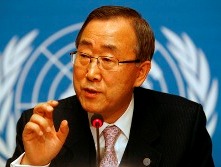Haiti has a "better chance" than other emerging market, Ban says
 New York - UN Secretary General Ban Ki-moon sounded an optimistic note for Haiti, saying its future looks better than any emerging markets thanks to US trade legislation approved by Washington last year.
New York - UN Secretary General Ban Ki-moon sounded an optimistic note for Haiti, saying its future looks better than any emerging markets thanks to US trade legislation approved by Washington last year.
"Haiti stands a better chance than almost any emerging economy, not only to weather the current economic storms, but to prosper," Ban said in an opinion piece to be published in the New York Times on Tuesday.
"The reason: new US trade legislation has thrown open a huge window of opportunity," he said.
Washington's Hope II programme will offers Haiti duty-free, quota- free access to the US market for the first time in nine years.
Ban said the trade agreement should be a foundation upon which Haiti can build political stability with the help of the UN peacekeeping mission and move beyond aid to genuine economic development.
Hampered by chronic development woes and destruction caused by frequent hurricanes in the Caribbean, Haiti is the poorest nations in the Western hemisphere.
Ban and former US president Bill Clinton in February visited Haiti to assess the situation in order to draw up assistance. The UN is maintaining a peacekeeping mission with more than 7,000 military and civilian personnel to help the government of President Rene Preval and train police and the army.
Ban said Haiti has the possibility to expand exports, in particular in textile and agricultural products, the country's traditional economic strengths. He said the export zones can create more jobs for the country's 9 million people, 80 per cent of whom live on less than 2 dollars a day.
He cited the example of Bangladesh, where 2.5 million people work in the garment industry. Uganda and Rwanda have had similar experiences in export-based economies.
"President Clinton and I saw many good signs during our trip, both large and small," Ban said.
He said already workers can make 7 dollars a day making T-shirts for exports. Hope II can double or triple production in the T-shirt industry within a year, he said. (dpa)